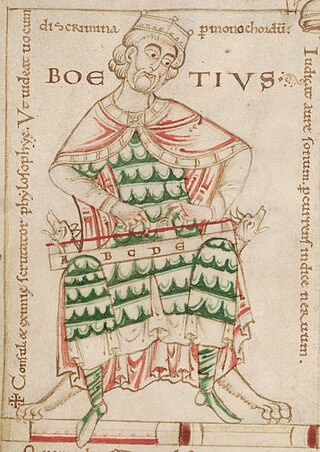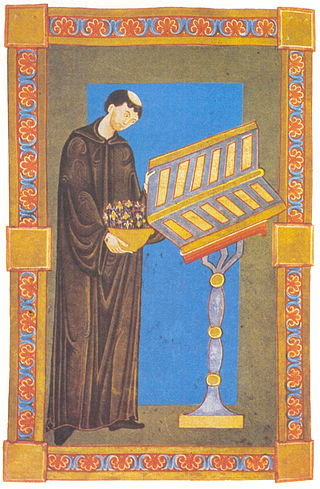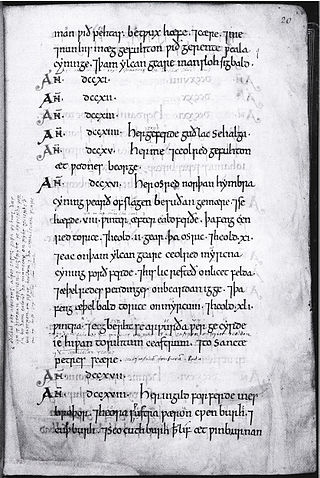Related Research Articles

Alfred the Great was King of the West Saxons from 871 to 886, and King of the Anglo-Saxons from 886 until his death in 899. He was the youngest son of King Æthelwulf and his first wife Osburh, who both died when Alfred was young. Three of Alfred's brothers, Æthelbald, Æthelberht and Æthelred, reigned in turn before him. Under Alfred's rule, considerable administrative and military reforms were introduced, prompting lasting change in England.
Old English literature refers to poetry and prose written in Old English in early medieval England, from the 7th century to the decades after the Norman Conquest of 1066, a period often termed Anglo-Saxon England. The 7th-century work Cædmon's Hymn is often considered as the oldest surviving poem in English, as it appears in an 8th-century copy of Bede's text, the Ecclesiastical History of the English People. Poetry written in the mid 12th century represents some of the latest post-Norman examples of Old English. Adherence to the grammatical rules of Old English is largely inconsistent in 12th-century work, and by the 13th century the grammar and syntax of Old English had almost completely deteriorated, giving way to the much larger Middle English corpus of literature.

The Anglo-Saxons were a cultural group that inhabited much of what is now England in the Early Middle Ages, and spoke Old English. They traced their origins to Germanic settlers who came to Britain from mainland Europe in the 5th century. Although the details are not clear, their cultural identity developed out of the interaction of these settlers with the pre-existing Romano-British culture. Over time, most of the people of what is now southern, central, northern and eastern England came to identify as Anglo-Saxon and speak Old English. Danish and Norman invasions later changed the situation significantly, but their language and political structures are the direct predecessors of the medieval Kingdom of England, and the Middle English language. Although the modern English language owes somewhat less than 26% of its words to Old English, this includes the vast majority of words used in everyday speech.

Scholasticism was a medieval school of philosophy that employed a critical organic method of philosophical analysis predicated upon the Aristotelian 10 Categories. Christian scholasticism emerged within the monastic schools that translated scholastic Judeo-Islamic philosophies, and thereby "rediscovered" the collected works of Aristotle. Endeavoring to harmonize his metaphysics and its account of a prime mover with the Latin Catholic dogmatic trinitarian theology, these monastic schools became the basis of the earliest European medieval universities, contributing to the development of modern science; scholasticism dominated education in Europe from about 1100 to 1700. The rise of scholasticism was closely associated with these schools that flourished in Italy, France, Portugal, Spain and England.

Anicius Manlius Severinus Boethius, commonly known simply as Boethius, was a Roman senator, consul, magister officiorum, historian, and philosopher of the Early Middle Ages. He was a central figure in the translation of the Greek classics into Latin, a precursor to the Scholastic movement, and, along with Cassiodorus, one of the two leading Christian scholars of the 6th century. The local cult of Boethius in the Diocese of Pavia was sanctioned by the Sacred Congregation of Rites in 1883, confirming the diocese's custom of honouring him on the 23 October.
The Old English Bible translations are the partial translations of the Bible prepared in medieval England into the Old English language. The translations are from Latin texts, not the original languages.

Tatwine was the tenth Archbishop of Canterbury from 731 to 734. Prior to becoming archbishop, he was a monk and abbot of a Benedictine monastery. Besides his ecclesiastical career, Tatwine was a writer, and riddles he composed survive. Another work he composed was on the grammar of the Latin language, which was aimed at advanced students of that language. He was subsequently considered a saint.
Anglo-Latin literature is literature from Britain originally written in Latin. It includes literature written in Latin from parts of Britain which were not in England or English-speaking: "Anglo-" is used here as a prefix meaning British rather than English.

Thiofrid was the Benedictine abbot of Echternach Abbey, and writer of works in several different areas. He is one of the few medieval writers to discuss the cult of relics, in his Flores epytaphii sanctorum.

John Joscelyn, also John Jocelyn or John Joscelin, (1529–1603) was an English clergyman and antiquarian as well as secretary to Matthew Parker, an Archbishop of Canterbury during the reign of Queen Elizabeth I of England. Joscelyn was involved in Parker's attempts to secure and publish medieval manuscripts on church history, and was one of the first scholars of the Old English (Anglo-Saxon) language. He also studied the early law codes of England. His Old English dictionary, although not published during his lifetime, contributed greatly to the study of that language. Many of his manuscripts and papers eventually became part of the collections of Cambridge University, Oxford University, or the British Library.
Reginald of Canterbury was a medieval French writer and Benedictine monk who lived and wrote in England in the very early part of the 12th century. He was the author of a number of Latin poems, including an epic entitled Malchus, which still survives.

European science in the Middle Ages comprised the study of nature, mathematics and natural philosophy in medieval Europe. Following the fall of the Western Roman Empire and the decline in knowledge of Greek, Christian Western Europe was cut off from an important source of ancient learning. Although a range of Christian clerics and scholars from Isidore and Bede to Jean Buridan and Nicole Oresme maintained the spirit of rational inquiry, Western Europe would see a period of scientific decline during the Early Middle Ages. However, by the time of the High Middle Ages, the region had rallied and was on its way to once more taking the lead in scientific discovery. Scholarship and scientific discoveries of the Late Middle Ages laid the groundwork for the Scientific Revolution of the Early Modern Period.

Anglo-Saxon riddles are a significant genre of Anglo-Saxon literature. The riddle was a major, prestigious literary form in early medieval England, and riddles were written both in Latin and Old English verse. The pre-eminent composer of Latin riddles in early medieval England was Aldhelm, while the Old English verse riddles found in the tenth-century Exeter Book include some of the most famous Old English poems.
Virginia Blanton is Curators' Distinguished Professor of English Language and Literature at the University of Missouri–Kansas City and eminent scholar in Early English Studies.

Israel the Grammarian was one of the leading European scholars of the mid-tenth century. In the 930s, he was at the court of King Æthelstan of England (r. 924–39). After Æthelstan's death, Israel successfully sought the patronage of Archbishop Rotbert of Trier and became tutor to Bruno, later the Archbishop of Cologne. In the late 940s Israel is recorded as a bishop, and at the end of his life he was a monk at the Benedictine monastery of Saint-Maximin in Trier.
Petra Kehl is a German scholar of the Middle Ages, specifically of the veneration of saints. Kehl's monograph Kult und Nachleben des hl. Bonifatius (1993) is one of two monographs on the veneration of Saint Boniface. Her study was praised by one reviewer as written "with meticulous care", and by another as "an account that deserves wide recognition, a standard for scholarship for years to come". Kehl lives in Fulda, where she runs a publishing company specializing in historical fiction, religious literature, and children's literature.

The hermeneutic style is a style of Latin in the later Roman and early Medieval periods characterised by the extensive use of unusual and arcane words, especially derived from Greek. The style is first found in the work of Apuleius in the second century, and then in several late Roman writers. In the early medieval period, some leading Continental scholars were exponents, including Johannes Scotus Eriugena and Odo of Cluny.
The Old English Boethius is an Old English translation/adaptation of the sixth-century Consolation of Philosophy by Boethius, dating from between c. 880 and 950. Boethius's work is prosimetrical, alternating between prose and verse, and one of the two surviving manuscripts of the Old English translation renders the poems as Old English alliterative verse: these verse translations are known as the Metres of Boethius.
Arthur George Rigg was a British academic and medievalist.

De raris fabulis is a collection of 23 or 24 short Latin dialogues from 9th- or 10th-century Celtic Britain. The dialogues belong to the genre known as the colloquy. These were pedagogical texts for teaching Latin in monastic schools.
References
- ↑ Brown, George Hardin (2003). "The Dynamics of Literacy". In Donald Scragg (ed.). Textual and Material Culture in Anglo-Saxon England: Thomas Northcote Toller and the Toller Memorial Lectures. D. S. Brewer. pp. 183–212.
- ↑ Boynton, Susan (2010). "Medieval Musical Education as Seen through Sources Outside the Realm of Music Theory". In Weiss, Susan Forscher; Murray, Russell E. Jr; Cyrus, Cynthia J. (eds.). Music Education in the Middle Ages and the Renaissance. Indiana UP. pp. 52–62. ISBN 978-0-253-00455-0.
- ↑ Love, Rosalind C. (2012). "The Latin Commentaries on Boethius' De Consolatione Philosophiae from the 9th to the 11th Centuries". In Kaylor, Noel Harold; Phillips, Philip Edward (eds.). A Companion to Boethius in the Middle Ages. Leiden: Brill. ISBN 978-90-04-22538-1.
- ↑ "Teaching and Learning in Medieval Europe: Essays in Honour of Gernot R. Wieland". Brepols. 2017. Retrieved 21 June 2017.